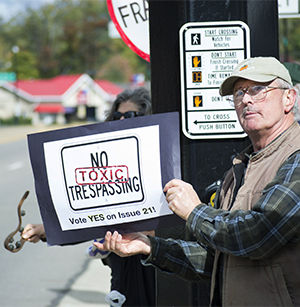AP: Ohio Supreme Court ruling favors fracking

David Stover, a resident of Tallmadge, holds his Issue 21 sign out to the passing traffic on E. Main with other demonstrators from the Global Frackdown rally Saturday, Oct. 11, 2014. Issue 2, on the Nov. 4 ballot, could create a community bill of rights for the city of Kent that would allow the community to have more of a say in the creation and location of fracking and drilling.
February 20, 2015
By a 4-3 vote, Ohio Supreme Court justices decided Tuesday that cities, townships and counties cannot impose regulations on oil and natural gas drillers, effectively overruling any local fracking bans passed throughout the state.
One of the dissenting justices believes this ruling gives the Ohio Department of Natural Resources too much power over local officials, as Justice Judith Lanzinger said, “local zoning is exercise of local police power to promote the health, safety, and general welfare of the public.
“There is no need for the state to act as the thousand-pound gorilla, gobbling up exclusive authority over the oil and gas industry, leaving not even a banana peel of home rule for municipalities,” Lanzinger wrote.
The Ohio high court ruled on a case in which the city of Munroe Falls tried to apply regulations to Beck Energy Corp.’s operations in Summit County after Beck had already received a drilling permit from the DNR. When the drilling began, Munroe Falls officials said Beck’s activities were illegal because the company did not comply with city ordinances.
Among the local requirements the city tried to impose were that Beck obtain a city drilling permit; pay an application fee; get a zoning certificate; get right-of-way construction permits; and post a performance bond.
In lauding the court’s decision, Ohio Oil and Gas Association Senior Vice President Shawn Bennett said at least three Buckeye State cities — Athens, Yellow Springs and Oberlin — attempted to impose fracking bans. Although Munroe Falls did not seek an absolute ban, Bennett said the proposed requirements would greatly hinder a driller’s operations.
“These matters are best-managed by professionals who have the expertise to know where a well should go,” Bennett said. “Municipalities are not allowed to discriminate against an activity the state has permitted.”
In the majority opinion authored by Justice Judith French, the high court ruled that Ohio cities’ home rule powers do not apply to oil and natural gas drilling. She explained that Munroe Falls’ ordinances and the state statute regulate the same activity. The ordinances make the state permit “meaningless” unless Beck Energy abides by the city’s permitting requirements as well.
“This is a classic licensing conflict under our home rule precedent,” French wrote. “We have consistently held that a municipal-licensing ordinance conflicts with a state-licensing scheme if the ‘local ordinance restricts an activity which a state license permits.'”
Joining French in the majority were Chief Justice Maureen O’Connor, Justice Sharon Kennedy and Justice Terrence O’Donnell. Along with Lanzinger, Justice Paul Pfeifer and Justice William O’Neill opposed the decision.
“What I believe must be recognized is that the state and the local authority have differing interests in this important matter,” Lanzinger added.
O’Neill, the high court’s lone Democrat, said local control of drilling has been taken from Ohio residents.
“The Ohio General Assembly has created a zookeeper to feed the elephant in the living room,” he wrote. “What the drilling industry has bought and paid for in campaign contributions they shall receive.”
In West Virginia, at least three cities — New Martinsville, Wellsburg and Morgantown — tried to ban fracking within their boundaries in 2011. However, Mountain State courts quickly ruled the state Department of Environmental Protection had the sole authority to regulate drilling and fracking, thus invalidating any local restrictions.
New Martinsville and Wellsburg quickly changed their positions in the face of protest from those who had signed drilling contracts. Morgantown City Council passed a ban on drilling within city limits, but that ordinance was overturned by a local judge in August 2011.
























